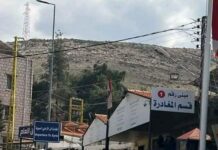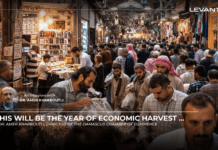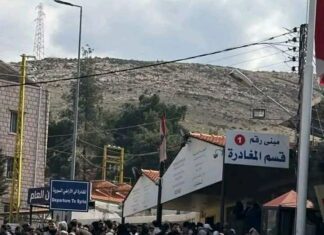
Syrian refugees who had fled the Assad regime to Lebanon years ago are now fleeing back to Syria, escaping the escalating Israeli bombardment of southern Lebanon. Many of these displaced individuals, however, are not returning to their homes in areas controlled by the Assad regime but are seeking refuge in liberated territories in northwestern Syria, under revolutionary administration by the Syrian Interim Government (SIG) and the Syrian Salvation Government (SSG).
Hundreds of families, including women and children, have been stranded for days at the Aoun al-Dadat crossing in the Aleppo countryside, hoping to cross into liberated areas. Video footage published on October 3 showed families heading toward areas under the control of the Turkish-backed Syrian National Army (SNC), a faction affiliated with the SIG.
Despite the recent entry of families, many others remain stranded. Security procedures at the crossing have caused delays, as military police continue to screen those attempting to enter. Asem Al-Malhem, a journalist and activist, expressed frustration over the situation, stating that security screenings have left hundreds waiting in limbo, including families with sick children in urgent need of care.
According to local reports, activists and residents in the region pressured military police, who had initially blocked the crossing, to allow the families to enter. The protesters stormed the crossing and refused to leave until the stranded individuals were given safe passage. Jalal Al-Talawi, head of the media office for the interim government, stated that meetings were held to address the situation, resulting in promises to expedite the entry process. “The situation is urgent,” Al-Talawi said, “All families present have the right to enter the north.”
Some of the families now entering Syria are opting to resettle in territories outside the regime’s control, such as areas governed by the SIG and SSG. These regions have become sanctuaries for many Syrians who refuse to return to areas controlled by Assad’s government, which has been accused of numerous human rights violations and war crimes.
The SSG’s Department of Political Affairs emphasized the humanitarian nature of the current crisis in an October 4 statement which welcomed a new wave of Syrian refugees returning from Lebanon to northern Syria. The release mentioned the ongoing war and worsening conditions in Lebanon as key factors driving their decision.
It also condemned any forced returns to Assad-controlled areas, calling for international support to assist the returnees in rebuilding their lives, while urging humanitarian organizations, including the UN, to fulfill their responsibilities in providing urgent aid to those in need.
Syrians face difficult decisions, with many fearing returning to regime-held areas where they face additional difficulties and are endangered. According to the Syrian National Coalition (SNC), the Assad regime continues to arbitrarily arrest returning refugees. In September alone, at least nine refugees were detained upon re-entering Syria.
Hadi Al-Bahra, head of the coalition, stressed that “Syria is not safe in the presence of the [Assad] regime,” urging international organizations to ensure the protection of refugees. This stance is echoed by displaced families, many of whom are now turning to smuggling routes or seeking refuge in liberated territories to avoid arrest.
The SNC has called on the UNHCR and other international organizations to intervene and provide protection for those displaced by the conflict. Al-Bahra urged the international community to take immediate action to prevent further suffering and ensure the safety of refugees fleeing both Lebanon and Syria.
During this crisis, both the SSG and the SIG seek to provide safety and shelter for those entering the liberated areas. Abdurahman Muhammad, Director of Public Relations for the SSG, stated that the government has taken steps to secure displaced families. “The Directorate of Arrivals will receive the displaced families and coordinate with their relatives in the region. The Ministry of Development and Humanitarian Affairs is also establishing shelters for those without homes or family.”








